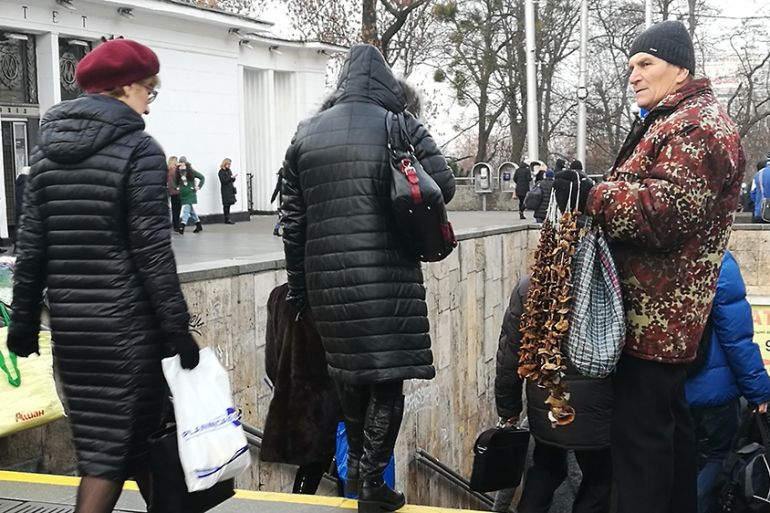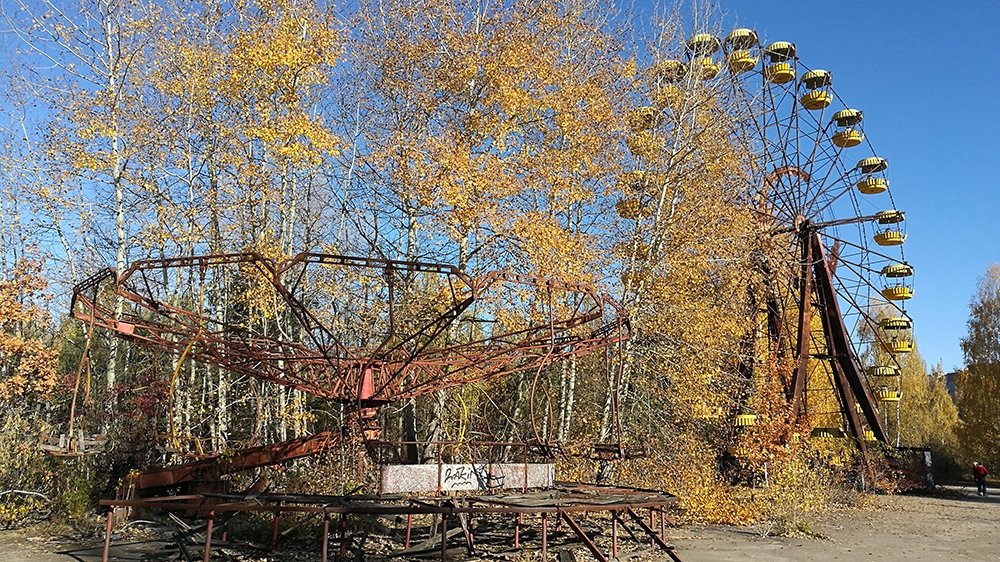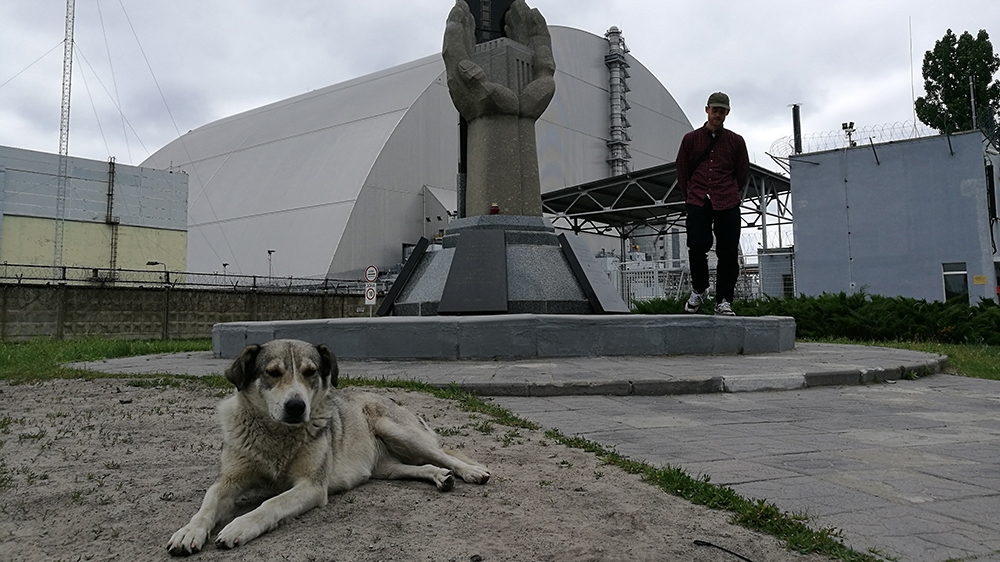In Chernobyl’s radioactive zone, a shadow economy thrives
In the years since the 1986 reactor explosion, an illegal economy has metastasised throughout the ‘Alienation Zone’.

Chernobyl, Ukraine – To some Ukrainians, Chernobyl is a bonanza.
In the years since the town’s 1986 reactor explosion, an entire illegal economy has metastasised throughout the poorly guarded, forest-covered “Alienation Zone” around the shut-down Chernobyl nuclear power plant, allegedly with the help of corrupt officials and police officers, cut-throat entrepreneurs and impoverished villagers.
Keep reading
list of 4 itemsA flash flood and a quiet sale highlight India’s Sikkim’s hydro problems
Why is Germany maintaining economic ties with China?
Behind India’s Manipur conflict: A tale of drugs, armed groups and politics
Despite obvious health risks to undocumented workers and unsuspecting customers, they log thousands of hectares of trees that become timber or charcoal, smuggle thousands of tonnes of irradiated scrap metal, poach fish and game, pick and sell contaminated berries and mushrooms, and illegally mine amber, according to anti-corruption groups, environmentalists, officials, police and court documents.
“Chernobyl has become a cesspool of corruption, a source of timber, [scrap] metal, berries and everything that grows there,” Roman Bochkala, head of Stop Corruption, a Ukrainian non-profit that investigates corruption in the zone, told Al Jazeera.
Kyiv-based analyst Aleksei Kushch said: “The zone is being ruthlessly exploited by marauders protected from the top” of the government.

“Marauders” was the epithet the Chernobyl plant’s former director used when describing the new top management in charge of the zone, appointed in 2014 through the party of ex-Prime Minister Yulia Tymoshenko.
“They did not want to work professionally. They did not even want to find out how things were. They simply wanted to take all the money,” Serhiy Parashin, who worked as the plant’s director general from 1994 to 1998, told Al Jazeera.
After Parashin wrote an open letter to then-President Petro Poroshenko, the managers were replaced, but the problem did not go away, becoming a dark reflection of ubiquitous graft that made Ukraine the world’s 120th most-corrupt nation out of 180 countries surveyed in 2018 by corruption watchdog Transparency International.
“Unfortunately, the Alienation Zone is a symbol of corruption in Ukraine,” the ex-Soviet nation’s new, anti-establishment President Volodymyr Zelenskyy said last July, decrying “the illegal smuggling of scrap metal and the use of natural resources”.
Scrap it!
Aliens visited Earth.
Briefly, only to leave thousands of artefacts, mostly unfathomable, frequently lethal and occasionally useful in the “zone,” a contaminated area abandoned by humans, cordoned off and heavily guarded. But gutsy, greedy explorers known as “stalkers” risk their lives to deliver the artefacts to scientists, businessmen and arms dealers.
This is the plot of The Roadside Picnic, a cult Soviet sci-fi novel by the Strugatsky brothers whose protagonists lent their name to modern-day, real-life stalkers of the Chernobyl Alienation Zone.
Unlike their fictional prototypes, these adrenalin junkies and urban explorers do not bring back radioactive stuff. Instead, they spend days and even weeks in the remote corners of the zone’s 2,600 square kilometres – and often witness its plundering.
It was a stalker who first told the Stop Corruption group about illegal timber logging.
Others witness the disappearance of rusty machinery, central heating pipes from empty apartment buildings, fences and other kinds of scrap metal – no matter how irradiated.

Metal smuggling was especially rife in the 1990s, when Ukraine’s painful post-Soviet transition to a market economy left many destitute and desperate to earn money any way they could.
“I’ve seen entire [abandoned] trucks and tonnes of metal disappear from places where you can get a lethal dose [of radiation] within a minute,” a stalker who visited the zone dozens of times told Al Jazeera on condition of anonymity.
But there are far more organised methods of smuggling.
In 2016, a truck carrying 20 tonnes of copper-nickel pipes was detained on the Ukrainian-Polish border. The cargo emitted radioactivity at 4.17 microsieverts per hour – almost 15 times above permissible levels, officials said.
The pipes were “decommissioned” from Chernobyl’s first and second reactors, which shut down in the 1990s. Moreover, state auditors found that about 7,000 tonnes of scrap metal were missing from the station’s storages, and concluded that the metal was “possibly sold” for about $2m.
A Kyiv court established that Chernobyl plant’s director general, Ihor Hramotkin, sold decommissioned scrap metal at “deliberately low prices,” embezzled more than $700,000 and “appropriated” international aid, including money and equipment.
However, the investigations never resulted in convictions, and Hramotkin resigned in 2018 over “disagreements” with Ukraine’s environment ministry.
‘Solar stone’
Another worrying development began in the zone in recent years.
The forested regions of northwestern Ukraine have become an epicentre of illegal amber mining reportedly worth hundreds of millions of dollars a year. Illicit amber “diggers” irreversibly damage soil with deep, crater-like holes where pressurised water is used to wash away the 50-million-year-old layer of soil that contains amber.
The use of their primitive technology in the zone brings buried radionuclides to the surface – while the “diggers” spend hours in deep pits and frigid water being exposed to radiation. Dozens of them started entering the zone’s least accessible northern part in recent years – with shovels, pumps and Soviet-era maps of geological surveys conducted before the Chernobyl explosion, a regional official says.
“They went there already knowing the locations, the coordinates of where amber would potentially be,” Oleksandr Nikolaychuk, the deputy mayor of the northwestern town of Olevsk, who extensively studied the illicit amber trade, told Al Jazeera.
At least two groups of “diggers” were arrested in 2016, police said.

Metal and amber in the zone can be potentially exhausted – unlike the “renewable” sources of illicit profits summarised by a Chernobyl staffer almost 38 years ago.
“Fishing is great, the [Pripyat] river is fast-flowing, clean; there are mushrooms all around, we spend our vacations only here. There is plenty of berries of any kind,” Mikhail Lushinsky, who headed a lab that monitored the plant’s environment, said in a 1982 documentary.
Radioactive berries
One does not have to go far to buy cheap blueberries in Kyiv between July and September.
Elderly women or men with calloused hands hawk the pea-sized, vitamin-rich berries straight from the forest next to bus stops or subway stations, at traffic stops or on street corners for $3 to $4 per kilogramme – a much lower price than in supermarkets or grocery shops that mostly sell larger, farmed blueberries after obligatory radiation checks.
But cheapness has a dark side: the berries are sometimes radioactive.
The zone stands in the Polesia, an impoverished region in Ukraine’s north with poor soils, mosquito-infested swamps and dense forests. The Chernobyl fallout irradiated many areas in Polesia, but villagers still pick and sell blueberries, cranberries and mushrooms.
“They pick them anyway, because they are their only source of income,” Stop Corruption’s Bochkala said.
Last year, food safety inspectors armed with radiation meters found 16 batches of blueberries with a high content of radioactive cesium 137 that were picked in the zone or other contaminated areas, the State Service for Food Safety and Consumer Protection told the TSN television network.
The Service did not reply to Al Jazeera’s multiple requests for comment and data.
Meanwhile, every year police detain several people with buckets of berries or mushrooms in the zone.
The real figure is, however, much higher, because some food inspectors and police officers are corrupt and turn a blind eye to the peddling of untested berries and mushrooms, observers claim.
“They are very, very much interested in [the smuggling],” Maksim Nesmeyanov, director of the Ukrainian Consumers Union, a monitoring group in Kyiv, told Al Jazeera, “because it is them driving past the markets without noticing the sellers.”
Stalkers also claim that corrupt police officers condone the smuggling of the zone’s edibles – and “enlist” the villagers in their perennial conflict with the stalkers.
“Villagers and cops made a deal: cops let them pick berries and mushrooms and get them out of the zone, and the villagers snitch on stalkers who enter the zone,” another stalker told Al Jazeera on condition of anonymity.
Another part of the conundrum is the wholesale buyers of berries who ignore possible contamination and often mix berries from clean areas and suspicious sources.
“They put a couple of hundred dollars in their pocket and don’t give a damn about where the berries go and who gets poisoned,” Yaroslav Movchun, owner of the Ozeryana berry farm in the northwestern Zhytomyr region, told Al Jazeera.
The smuggled edibles are not limited to berries or mushrooms.
Each nuclear plant needs a steady source of water that is warmed by nuclear fuel rods to generate steam in turbines – and cool spent rods. The Chernobyl plant stands on the Pripyat river that is surrounded by rivulets, wetlands and swamps.
Schools of fish in the plant’s cooling pond bewilder tourists with their appetite for food scraps – while fish is caught from less-visited bodies of water. The fishers get caught, too. In late November, police arrested a group of poachers with 185 perch, carp and asp.
Sometimes, police are involved in the poaching. In March, the Security Service of Ukraine said it apprehended a police officer who “managed” a group of poachers who smuggled fish worth more than $6,000.
The fish bypasses food inspectors who don’t check smoked and dried fish sold throughout Ukraine, observers claim.
“They don’t run microbiology [tests that identify radiation levels], they run the simplest tests,” Consumers Union’s Nesmeyanov said.